

Race-and-voting-rights-in-ferguson.html?hp&action=click&pgtype=Homepage&module=c-column-top-span-region®ion=c-column-top-span-region&WT. Photo For most people, Ferguson, Mo., will be remembered for one awful August afternoon, when a white police officer there shot and killed an unarmed black teenager, Michael Brown.
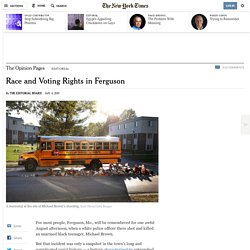
But that incident was only a snapshot in the town’s long and complicated racial history — a history characterized by entrenched segregation and economic inequality, as well as by familiar and systemic obstacles that have kept black residents from holding positions of political power. Ferguson’s population is two-thirds African-American, and yet its mayor, city manager and five of its six City Council members are white.
So are its police chief and all but three officers on its 53-member police force.
QuickFacts. Skip to main navigation U.S.
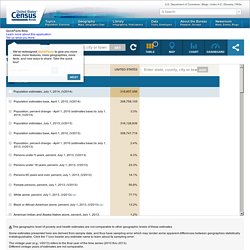
Department of Commerce | Blogs | Index A-Z | Glossary | FAQs United States Census Bureau Skip Main Navigation Skip To Navigation Content <div id="njs">This navigation uses Javascript. 001_-_complaint.pdf. Missouri NAACP v. Ferguson-Florissant School District. December 18, 2014 The ACLU today filed a federal lawsuit against Missouri's Ferguson-Florissant School District, charging the district's electoral system is locking African-Americans out of the political process.
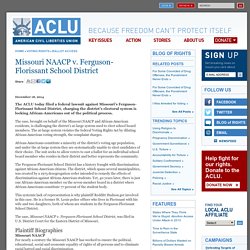
The case, brought on behalf of the Missouri NAACP and African-American residents, is challenging the district's at-large system used to elect school board members. The at-large system violates the federal Voting Rights Act by diluting African-American voting strength, the complaint charges. African-Americans constitute a minority of the district's voting age population, and under the at-large system they are systematically unable to elect candidates of their choice. The suit seeks to allow voters to cast a ballot for an individual school board member who resides in their district and better represents the community. Racial-Discrimination-in-Voting-Whitepaper.pdf. Protecting Minority Voters: Our Work is Not Done. New Report Shows Continued Pattern of Voting Rights Discrimination—African American, Latino, Asian American and Native American Voters More Vulnerable Than Ever On the anniversary of the signing of the Voting Rights Act and a year after the Supreme Court’s Shelby County v Holder decision gutted a vital protection of the Voting Rights Act (VRA), the National Commission on Voting Rights has released a new report showing where and how minority voters continue to be harmed by racial discrimination in voting.
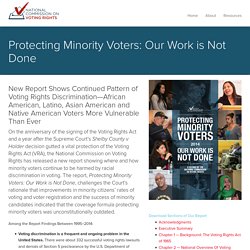
The report, Protecting Minority Voters: Our Work is Not Done, challenges the Court’s rationale that improvements in minority citizens’ rates of voting and voter registration and the success of minority candidates indicated that the coverage formula protecting minority voters was unconstitutionally outdated. Among the Report Findings Between 1995–2014: Voting discrimination is a frequent and ongoing problem in the United States. Download the Full Report Download Executive Summary. Justia U.S. Supreme Court Center. Rogers v.
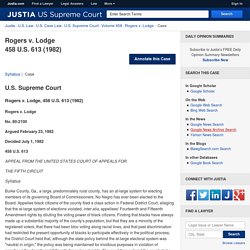
Lodge, 458 U.S. 613 (1982) Rogers v. Lodge No. 80-2100 Argued February 23, 1982. Limited Voting, Cumulative Voting and Choice Voting: Limited Voting, Cumulative Voting and Choice Voting: A Comparison of Three Alternative Voting Systems This sheet examines the pros and cons associated with the three most commonly-used proportional / semi-proportional systems in the United States: limited voting, cumulative voting (in its two major variations) and choice voting.
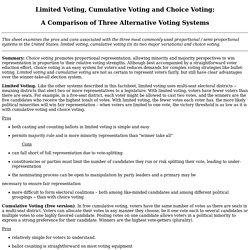
Summary: Choice voting promotes proportional representation, allowing minority and majority perspectives to win representation in proportion to their relative voting strengths. Although best accompanied by a straightforward voter eduction effort, choice voting is an easy system for voters and reduces demands for complex voting strategies like bullet-voting. Report2.pdf. Education Week. Published Online: February 25, 2013 Published in Print: February 27, 2013, as Districts Dumping At-Large Races Luis Carlos Ayala introduces himself to a resident as he campaigns for the Pasadena Unified school board.
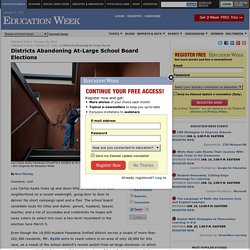
—Eric Grigorian for Education Week Pasadena, Calif. Luis Carlos Ayala treks up and down hilly driveways in a local neighborhood on a recent weeknight, going door to door to deliver his short campaign spiel and a flier. Other Links.